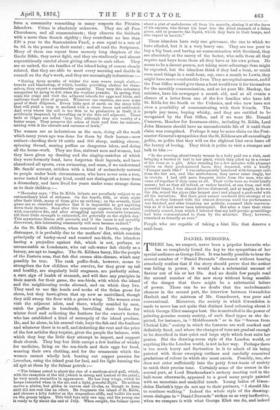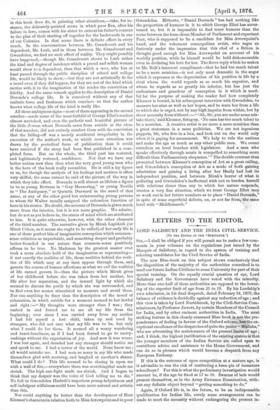DANIEL DERONDA.
THERE has, we suspect, never been a popular favourite who has so completely found the key to the sympathies of her special audience as George Eliot. It was hardly possible to hear the second number of "Daniel Deronda " discussed without hearing somebody confess that if the story should prove that the author was failing in power, it would take a substantial amount of flavour out of his or her life. And no doubt few people read the second number of the new story without being sensible of the danger that there might be a substantial failure of power. There can be no doubt that the melodramatic element in the second part, the interview between Gwendolen Harleth and the mistress of Mr. Grandcourt, was poor and conventional. Moreover, the society in which Gwendolen is made to move has not quite that distinct local colouring about it which George Eliot manages best. She is unrivalled in the power of painting genuine county society, of such fixed types as she de- picted, for instance, in " Middlemarch " or in the "Scenes from Clerical Life," society in which the features are well marked and definitely fixed, and where the changes of tone are gradual enough to be described in that quiet and large style which best suits her genius. But the drawing-room style of the London world, or anything like the London world, is not in her way. Perhaps there is too much hurry and fluctuation in it to admit of its being painted with those sweeping outlines and carefully conceived gradations of colour in which she most excels. Possibly, too, she does not enter sufficiently into the petty fever-beats of society to catch their precise tone. Certainly some of the scenes in the second part, at Lord Brackenshaw's archery meeting and in the ball-room afterwards, appeared to a good many people painted with an uncertain and unskilful touch. Young ladies of Gwen- dolen Harleth's type do not say to their partners, "I should like to continue walking." Indeed the whole style of the drawing- room dialogue in" Daniel Deronda " strikes us as very ineffective, when we compare it with what George Eliot can do, and indeed in this book does do, in painting other situations,—take, for in- stance, the delicately-painted scene in which poor Rex, after his failure in love, comes with his sister to entreat his father's consent to the plan of their starting off together for the backwoods in one of our Colonies. In that scene there is definite effect in every touch. In the conversations between Mr. Grandcourt and his dependent, Mr. Lush, and in those between Mr. Grandcourt and Gwendolen, we find no such effect of reality. They might possibly have happened,—though Mr. Grandcourt shows to Lush rather the kind and degree of insolence which a proud and selfish woman would show to a dependent, than that which a man, who has at least passed through the public discipline of school and college life, would be likely to show,—but they are not artistically fit for a novel even if they did happen, for they are not of the kind which carries with it to the imagination of the reader the conviction of fidelity. And the same remark applies to the description of Daniel Deronda's college life. It is conceived without any of that realistic force and freshness which convince us that the author knows what college life of the kind is really like.
All these ambiguous signs—most of them appearing in the second number—made some of the most faithful of George Eliot's readers almost wretched, and even the pathetic and beautiful picture of the little Jewess whom Deronda saves from suicide at the close of that number, did not entirely comfort them with the conviction that the falling-off was a merely accidental irregularity in the execution of the author's work, to which more attention was drawn by the periodical form of publication than it could have received if the story had been first published in a com- pleted form. But on the whole, the third part has restored, and legitimately restored, confidence. Not that we have any better notion now than then what the very good young man who is the hero of the book really resembles. He is still a lay figure to us, for though the analysis of his feelings and motives is often very skilful, the same cannot be said of the picture of the way in which they take effect. Deronda is still almost as lifeless a figure to us as young Bertram in "Guy Mannering," or young Neville in "The Antiquary," or Quentin Durward in the novel of that name, or any of the other good but uninteresting young persons to whom Sir Walter usually assigned the colourless function of hero in his stories. No doubt, the account of Deronda is given much more from the interior, but it is not more graphic. We admire, but do not as yet believe in, the states of mind which are attributed to him. It is quite otherwise, however, with the other elements of the third number. The narrative given by Mirah Lapidoth (or Mirah Cohen, as it seems she ought to be called) of her early life is one of those perfect bits of imaginative conception which common- sense criticises as improbable, and something deeper and probably better-founded in our nature than common-sense positively affirms to be true. No Madonna by the greatest master ever took a more absolute hold of the imagination as representing— if not exactly the realities of life, those realities behind the reali- ties of life which may at any time appear through them, and govern the course of human affections as what we call the realities of life cannot govern it—than the picture which Mirah gives of her childhood before she was taken from her mother, her life after her separation, and the inward light by which she seemed to discern the perils by which she was surrounded, and to find even her senses stimulated to measure and avoid them. Nor can anything be finer than the description of the mood of exhaustion, in which suicide for a moment seemed to her lawful and right :—" My thoughts were stronger than I was ; they rushed in and forced me to see all my life from the beginning; ever since I was carried away from my mother I had felt myself a lost child, taken up and used by strangers, who did not care what my life was to be, but only what I could do for them. It seemed all a weary wandering and heart-loneliness, as if I had been forced to go to merry- makings without the expectation of joy. And now it was worse. I was lost again, and dreaded lest any stranger should notice me and speak to me. I had a terror of the world. None knew me ; all would mistake me. I had seen so many in my life who made themselves glad with scorning, and laughed at another's shame. What could I do ? This life seemed to be closing in upon me with a wall of fire,—everywhere there was scorchingthat made me shrink. The high sun-light made me shrink. And I began to think that my despair was the voice of God telling me to die." No foil to Gwendolen Harleth's imperious young-ladyishness and self-indulgent wilfulness could have been more natural and artistic than this.
Nor could anything be better than the development of Herr Klesmer's charaeterin relation both to Miss Arrowpoint and to poor
Gwendolen. Hitherto, "Daniel Deronda" has had nothing like the proportion of humour in it to which George Eliot has accus- tomed us, but it is impossible to find truer humour than the scene between the hum-drum Member of Parliament and expectant Peer, who is supposed to be a candidate for Miss Arrowpoint's hand, and the vehement cosmopolitan artist, who rages so furiously under the impression that this clod of a Briton is thought good enough for Miss Arrowpoint on account of his worldly position, while he himself would be held dishonourable even in declaring his love for her. The fierce reply which he makes to Mr. Suit's innocent compliment—that he had too much talent to be a mere musician—is not only most dramatic in the anger which it expresses at the depreciation of his position in life by a rival whom the world regards as so much his superior, and whom he regards as so greatly his inferior, but has just the enthusiasm and grandeur of conception in it which is need- ful for the purpose of making the reader feel how completely Klesmer is bound, in his subsequent interview with Gwendolen, to measure her aims as well as her hopes, and to warn her from a life to which she is urged, not by any high impulse from within, but by sheer necessity from without :—" 'Ah, Sir, you are under some mis- take there,' said Klesmer, firingup. 'No man has too much talent to be a musician. A creative artist is no more a mere musician than a great statesman is a mere politician. We are not ingenious puppets, Sir, who live in a box, and look out on the world only when it is gaping for amusement. We help to rule the nations and make the age as much as any other public men. We count ourselves on level benches with legislators. And a man who speaks effectively through music is compelled to something more difficult than Parliamentary eloquence." The double contrast thus presented between Klesmer's conception of Art as a great calling, and Gwendolen's conception of Art as a mode of both gaining admiration and gaining a living after her finally had lost its independent position, and between Mirah's horror of what is polluting and Gwendolen's ineffectual wish not to burden herself with relations closer than any to which her nature responds, creates a very fine situation, which we trust George Eliot may so work outin her future numbers as to place "Daniel Deronda," in spite of some superficial defects, on, or not far from, the same level with " Middlemarch."



































 Previous page
Previous page